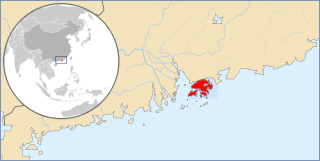Commonwealth banknote-issuing institutions also British Empire Paper Currency Issuers comprises a list of public, private, state-owned banks and other government bodies and Currency Boards who issued legal tender: banknotes.

A central bank, reserve bank, national bank, or monetary authority is an institution that manages the currency and monetary policy of a country or monetary union. In contrast to a commercial bank, a central bank possesses a monopoly on increasing the monetary base. Many central banks also have supervisory or regulatory powers to ensure the stability of commercial banks in their jurisdiction, to prevent bank runs, and in some cases also to enforce policies on financial consumer protection and against bank fraud, money laundering, or terrorism financing. Central banks play a crucial role in macroeconomic forecasting, which is essential for guiding monetary policy decisions, especially during times of economic turbulence.
The Eastern Caribbean dollar is the currency of all seven full members and one associate member of the Organisation of Eastern Caribbean States (OECS). The successor to the British West Indies dollar, it has existed since 1965, and it is normally abbreviated with the dollar sign $ or, alternatively, EC$ to distinguish it from other dollar-denominated currencies. The EC$ is subdivided into 100 cents. It has been pegged to the United States dollar since 7 July 1976, at the exchange rate of US$1 = EC$2.70.
Seigniorage, also spelled seignorage or seigneurage, is the difference between the value of money and the cost to produce and distribute it. The term can be applied in two ways:

The Reserve Bank of India is India's central bank and regulatory body responsible for regulation of the Indian banking system. Owned by the Ministry of Finance of the Government of India, it is responsible for the control, issue and maintaining supply of the Indian rupee. It also manages the country's main payment systems and works to promote its economic development.
The Hong Kong dollar is the official currency of Hong Kong. It is subdivided into 100 cents. Historically, it was also subdivided into 1000 mils. The Hong Kong Monetary Authority is the monetary authority of Hong Kong and the Hong Kong dollar.

In public finance, a currency board is a monetary authority which is required to maintain a fixed exchange rate with a foreign currency. This policy objective requires the conventional objectives of a central bank to be subordinated to the exchange rate target. In colonial administration, currency boards were popular because of the advantages of printing appropriate denominations for local conditions, and it also benefited the colony with the seigniorage revenue. However, after World War II many independent countries preferred to have central banks and independent currencies.
The Hong Kong Monetary Authority (HKMA) is the central banking institution of Hong Kong. It is a government authority founded on 1 April 1993 when the Office of the Exchange Fund and the Office of the Commissioner of Banking merged. The organisation reports directly to the Financial Secretary.
The British West Indies dollar (BWI$) was the currency of British Guiana and the Eastern Caribbean territories of the British West Indies from 1949 to 1965, when it was largely replaced by the East Caribbean dollar, and was one of the currencies used in Jamaica from 1954 to 1964. The monetary policy of the currency was overseen by the British Caribbean Currency Board (BCCB). It was the official currency used by the West Indies Federation. The British West Indies dollar was never used in British Honduras, the Cayman Islands, the Turks and Caicos Islands, the Bahamas, or Bermuda.
Barclays Bank has operated as a retail and commercial bank in Canada from 1929 to 1956, from 1979 to 1996, and most recently from 2010.

Money creation, or money issuance, is the process by which the money supply of a country, or an economic or monetary region, is increased. In most modern economies, money is created by both central banks and commercial banks. Money issued by central banks is a liability, typically called reserve deposits, and is only available for use by central bank account holders, which are generally large commercial banks and foreign central banks. Central banks can increase the quantity of reserve deposits directly, by making loans to account holders, purchasing assets from account holders, or by recording an asset, such as a deferred asset, and directly increasing liabilities. However, the majority of the money supply used by the public for conducting transactions is created by the commercial banking system in the form of commercial bank deposits. Bank loans issued by commercial banks expand the quantity of bank deposits.

The Trinidad and Tobago dollar is the currency of Trinidad and Tobago. It is normally abbreviated with the dollar sign $, or alternatively TT$ to distinguish it from other dollar-denominated currencies. It is subdivided into 100 cents. Cents are abbreviated with the cent sign ¢, or TT¢ to distinguish from other currencies that use cents. Its predecessor currencies are the Trinidadian dollar and the Tobagonian dollar.

The Central Bank of Barbados (CBB) is the national monetary authority and central bank responsible for providing advice to the Government of Barbados on banking and other financial and monetary matters. The Central Bank of Barbados, was established by Act of parliament on 2 May 1972. Prior to the establishment of CBB, Barbados' monetary policies were governed through its membership in the Eastern Caribbean Currency Authority (ECCA). The Central Bank operates as the banknote issuing authority for Barbadian currency.

The issue of banknotes of the Hong Kong dollar is governed in the Special Administrative Region of Hong Kong by the Hong Kong Monetary Authority (HKMA), the governmental currency board and central bank of Hong Kong. Under licence from the HKMA, three commercial banks issue their own banknotes for general circulation in the region. Notes are also issued by the HKMA itself.

Republic Bank Limited is a Caribbean financial institution headquartered in Trinidad and Tobago. It has operations in Anguilla, Barbados, the British Virgin Islands, the Cayman Islands, Dominica, Ghana, Grenada, Guyana, St. Kitts and Nevis, Saint Lucia, St. Maarten, St. Vincent and the Grenadines, Suriname and Trinidad and Tobago. It was formerly a division of Barclays Bank in Trinidad and Tobago.
The pound was the paper currency of South West Africa between the 1930s and 1959 by the Standard Bank of South Africa Limited, Barclays Bank, and Volkskas Limited. These notes circulated along with the South African pound notes of the South African Reserve Bank until 1961, when they were withdrawn and replaced with rand notes only. The South West African pound was pegged at par with the South African pound, which had replaced the South West African mark in 1918.
The history of currency in the British colony of Saint Lucia closely follows that of the British Eastern Caribbean territories in general. Even though Queen Anne's proclamation of 1704 brought the gold standard to the West Indies, silver pieces of eight continued to form a major portion of the circulating currency right into the latter half of the nineteenth century.

The Anglo-Egyptian Bank was a British overseas bank established in 1864.

The paper money of the Qing dynasty was periodically used alongside a bimetallic coinage system of copper-alloy cash coins and silver sycees; paper money was used during different periods of Chinese history under the Qing dynasty, having acquired experiences from the prior Song, Jin, Yuan, and Ming dynasties which adopted paper money but where uncontrolled printing led to hyperinflation. During the youngest days of the Qing dynasty paper money was used but this was quickly abolished as the government sought not to repeat history for a fourth time; however, under the reign of the Xianfeng Emperor, due to several large wars and rebellions, the Qing government was forced to issue paper money again.
Banking in Guyana follows the country's tumultuous economics history, from formal introduction under British rule, the socialist-oriented nationalization of banks at independence, to IMF sponsored open-market initiatives. The banking industry faces increased pressure to meet global standards domestically, as well as attract international investors, and serve the large number of diaspora that remain economically tied to the country.